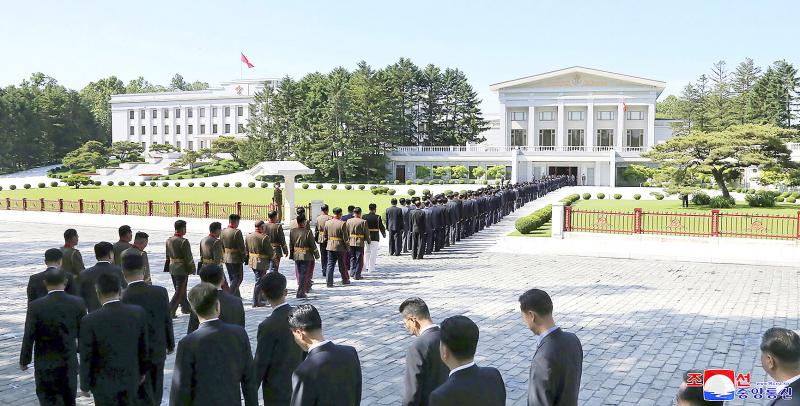China and Russia defended their vetoes of a US-led resolution that would have imposed new sanctions on North Korea, speaking at a UN General Assembly meeting on Wednesday.
The debate was held under new rules requiring the assembly to examine any veto wielded in the UN Security Council by one of its five permanent members.
China and Russia reiterated their opposition to more sanctions, blaming the US for rising tensions on the Korean Peninsula, and insisting that what is needed now is dialogue between North Korea and the administration of US President Joe Biden.

Photo: AP
The assembly’s adoption of a resolution on April 26 requiring a debate on the North Korea issue not only gives the country or countries casting a veto an opportunity to explain their reasons, but it gives all UN member nations “a welcome opportunity to share our views on the matter at hand,” he said.
The 13-2 vote on May 26 marked a first serious division among the council’s five veto-wielding permanent members — China, Russia, the US, Britain and France — on a North Korea sanctions resolution.
US Deputy Ambassador to the UN Jeffrey DeLaurentis told the assembly that recent missile launches by North Korea are “finalizing preparations for a potential seventh nuclear test.”
“The United States is more than prepared to discuss easing sanctions to achieve the complete denuclearization of the Korean Peninsula,” De Laurentis said.
Unfortunately, it has only responded with “destabilizing launches that threaten not only the region, but the world,” he said.
Chinese Ambassador to the UN Zhang Jun (張軍) accused the US of ignoring positive steps taken by North Korea and returning to its “old path” of “chanting empty slogans for dialogue and increasing sanctions against the” nation.
Russian Deputy Ambassador to the UN Anna Evstigneeva said that new sanctions “would be a dead end,” adding that current UN sanctions have failed to guarantee security in the region “nor moved us any further toward settling the nuclear missile non-proliferation issues.”
“Anyone who is seriously addressing the North Korean problem has long understood that it’s futile to expect Pyongyang to unconditionally disarm under the threat of a spiral of sanctions,” Evstigneeva said. “The creation of new military blocs in the regions, such as the formation of the US-Great Britain and Australia, casts serious doubt on the good intentions of these countries,” including in Pyongyang.

GAINING STEAM: The scheme initially failed to gather much attention, with only 188 cards issued in its first year, but gained popularity amid the COVID-19 pandemic Applications for the Employment Gold Card have increased in the past few years, with the card having been issued to a total of 13,191 people from 101 countries since its introduction in 2018, the National Development Council (NDC) said yesterday. Those who have received the card have included celebrities, such as former NBA star Dwight Howard and Australian-South Korean cheerleader Dahye Lee, the NDC said. The four-in-one Employment Gold Card combines a work permit, resident visa, Alien Resident Certificate (ARC) and re-entry permit. It was first introduced in February 2018 through the Act Governing Recruitment and Employment of Foreign Professionals (外國專業人才延攬及雇用法),

RESILIENCE: Deepening bilateral cooperation would extend the peace sustained over the 45 years since the Taiwan Relations Act, Greene said Taiwan-US relations are built on deep economic ties and shared values, American Institute in Taiwan (AIT) Director Raymond Greene said yesterday, adding that strengthening supply chain security in critical industries, enhancing societal resilience through cooperation and deepening partnerships are key to ensuring peace and stability for Taiwan in the years ahead. Greene made the remarks at the National Security Youth Forum, organized by National Taiwan University’s National Security and Strategy Studies Institution in Taipei. In his address in Mandarin Chinese, Greene said the Taiwan-US relationship is built on deep economic ties and shared interests, and grows stronger through the enduring friendship between

CAUTION URGED: Xiaohongshu and Douyin — the Chinese version of TikTok — are tools the Chinese government uses for its ‘united front’ propaganda, the MAC said Mainland Affairs Council (MAC) Minister Chiu Chui-cheng (邱垂正) yesterday urged people who use Chinese social media platforms to be cautious of being influenced by Beijing’s “united front” propaganda and undermining Taiwan’s sovereignty. Chiu made the remarks in response to queries about Chinese academic Zhang Weiwei (張維為) saying that as young Taiwanese are fond of interacting on Chinese app Xiaohongshu (小紅書, known as RedNote in English), “after unification with China, it would be easier to govern Taiwan than Hong Kong.” Zhang is professor of international relations at Shanghai’s Fudan University and director of its China Institute. When giving a speech at China’s Wuhan

ENHANCE DETERRENCE: Taiwan has to display ‘fierce resolve’ to defend itself for China to understand that the costs of war outweigh potential gains, Koo said Taiwan’s armed forces must reach a high level of combat readiness by 2027 to effectively deter a potential Chinese invasion, Minister of National Defense Wellington Koo (顧立雄) said in an interview with the Chinese-language Liberty Times (sister newspaper of the Taipei Times) published yesterday. His comments came three days after US Secretary of State Marco Rubio told the US Senate that deterring a Chinese attack on Taiwan requires making a conflict “cost more than what it’s worth.” Rubio made the remarks in response to a question about US policy on Taiwan’s defense from Republican Senator John Cornyn, who said that Chinese